Images show vessels from the British ‘Joint Expeditionary Force’ sailing together during an exercise.
Pictured HMS Ocean, HMS Bulwark and RFA Mounts Bay during Joint Expeditionary Force (Maritime) in the Mediterranean. September 28, 2016.
The JEF(M) Task Group came together for a PHOTEX, with HMS Bulwark, HMS Ocean, RFA Mounts Bay and MV Eddystone all in formation.
HMS Bulwark is currently deployed under Commander Amphibious Task Group who is leading the Royal Navy’s inaugural Joint Expeditionary Force (Maritime) Group deployment.
[su_custom_gallery source=”media: 7771,7770,7769,7768,7767,7766,7765,7747,7751,7752,7764″ limit=”30″ link=”lightbox” width=”120″ height=”120″ title=”never”]
This year’s major task group deployment, to the Mediterranean and Middle East, will demonstrate the Royal Navy’s enduring ability to deploy highly effective and combat-capable maritime forces anywhere in the world.
The Task Group will provide a powerful forward-deployed military capability, giving HM Government a range of options to allow the UK to respond rapidly in the event of an overseas crisis. The deployment demonstrates the Royal Navy’s contribution to the security and prosperity of the UK and a commitment to regional allies.
During the deployment, exercises in the Adriatic and Arabian Seas, and The Gulf, will enhance the group’s readiness for contingent operations and provide opportunities to further relationships with NATO allies and other partner nations.
The aim of the JEF is to create a UK military framework, focused around its existing and upcoming British high readiness capabilities, that its partners can join up with. While it is the UK’s intention to fully integrate the UK’s JEF partners’ contributions before 2018, the JEF could deploy immediately if required. It is designed with the following requirements in mind:
“a. act jointly and with allies, but able to act alone”
“b. be well equipped, but not tied to platforms”
“c. adapt as the environment changes”
Speaking before the Royal United Services Institute, Sir David Richards outlined the specific applications that the capabilities of the Joint Expeditionary Force will allow:
“With the capability to ‘punch’ hard and not be a logistical or tactical drag on a coalition, we will be especially welcomed by our friends and feared by our enemies. JEF will be capable of projecting power with global effect and influence.
Nowhere is more important to us than our friends in the Middle East and Gulf and in line with clear political intent we would expect, with other initiatives, for JEF elements to spend more time reassuring and deterring in that region.”
The UK’s contribution will include the lead commando, airborne, armoured, aviation, air and maritime task groups.
The Defence Secretary said:
“I am very pleased that we have signed a letter of intent with our partners to establish the Joint Expeditionary Force.
This will be developed around the UK’s existing high readiness units and will provide a capability that can respond anywhere in the world, in any environment, as part of a coalition, or on behalf of international organisations such as the UN and NATO.
We are stronger together. Our partners from Denmark, Estonia, Latvia, Lithuania, the Netherlands and Norway have all agreed to attach forces to the JEF when the time is right for us to stand together.”
The force will be a pool of high-readiness forces that can respond quickly to a range of issues, using combat power, conventional deterrence or humanitarian assistance. Such assistance could include setting up responses similar to that deployed to tackle the Ebola outbreak in West Africa.


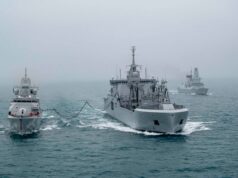
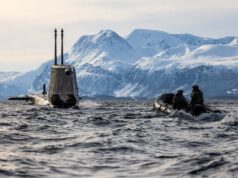
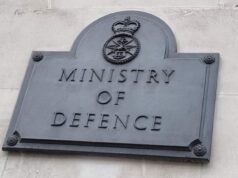
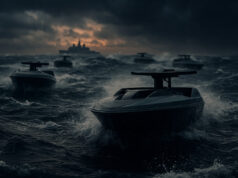
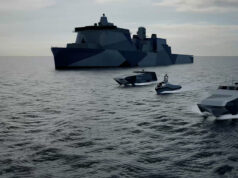
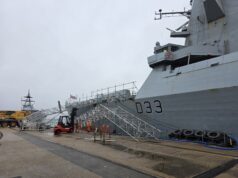



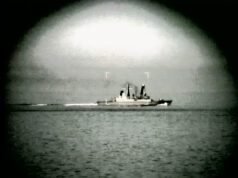

Is there no T45 or T23 escorting the task group?
Cart see three amphibious warfare ships being of much use. If there was a natural disaster or we had to avacuate people from a relatively safe harbour then yes, but that unlikely. And last time I checked we didn’t have any plans to invade any one any time sone.
No replacement for Ocean n SDSR16
did we forget our escorts or do we just not have any?
[…] reaction force formed by the Baltic states and several Nordic countries and the Netherlands, and Britain’s Joint Expeditionary Force, a “mini-NATO” whose members include the Baltic states, Sweden, and Finland. But in the absence […]
[…] reaction force formed by the Baltic states and several Nordic countries and the Netherlands, and Britain’s Joint Expeditionary Force, a “mini-NATO” whose members include the Baltic states, Sweden, and Finland. But in the absence […]
[…] reaction force formed by the Baltic states and several Nordic countries and the Netherlands, and Britain’s Joint Expeditionary Force, a “mini-NATO” whose members include the Baltic states, Sweden, and Finland. But in the absence […]
[…] reaction force formed by the Baltic states and several Nordic countries and the Netherlands, and Britain’s Joint Expeditionary Force, a “mini-NATO” whose members include the Baltic states, Sweden, and Finland. But in the absence […]
[…] reaction force formed by the Baltic states and several Nordic countries and the Netherlands, and Britain’s Joint Expeditionary Force, a “mini-NATO” whose members include the Baltic states, Sweden, and Finland. But in the absence […]
[…] reaction force formed by the Baltic states and several Nordic countries and the Netherlands, and Britain’s Joint Expeditionary Force, a “mini-NATO” whose members include the Baltic states, Sweden, and Finland. But in the absence […]
[…] reaction force formed by the Baltic states and several Nordic countries and the Netherlands, and Britain’s Joint Expeditionary Force, a “mini-NATO” whose members include the Baltic states, Sweden, and Finland. But in the absence […]
[…] di 2.400 militari formata dagli Stati baltici, da diversi paesi nordici e dai Paesi Bassi, e la Forza Congiunta di Spedizione della Gran Bretagna, una “mini NATO” i cui membri includono gli Stati baltici, la Svezia e la Finlandia. Ma […]
[…] di 2.400 militari formata dagli Stati baltici, da diversi paesi nordici e dai Paesi Bassi, e la Forza Congiunta di Spedizione della Gran Bretagna, una “mini NATO” i cui membri includono gli Stati baltici, la Svezia e la Finlandia. Ma in […]
[…] di 2.400 militari formata dagli Stati baltici, da diversi paesi nordici e dai Paesi Bassi, e la Forza Congiunta di Spedizione della Gran Bretagna, una “mini NATO” i cui membri includono gli Stati baltici, la Svezia e la Finlandia. Ma in […]
[…] di 2.400 militari formata dagli Stati baltici, da diversi paesi nordici e dai Paesi Bassi, e la Forza Congiunta di Spedizione della Gran Bretagna, una “mini NATO” i cui membri includono gli Stati baltici, la Svezia e la Finlandia. Ma in […]
[…] reaction force formed by the Baltic states and several Nordic countries and the Netherlands, and Britain’s Joint Expeditionary Force, a “mini-NATO” whose members include the Baltic states, Sweden, and Finland. But in the absence […]
[…] di 2.400 militari formata dagli Stati baltici, da diversi paesi nordici e dai Paesi Bassi, e la Forza Congiunta di Spedizione della Gran Bretagna, una “mini NATO” i cui membri includono gli Stati baltici, la Svezia e la Finlandia. Ma in […]
[…] di 2.400 militari formata dagli Stati baltici, da diversi paesi nordici e dai Paesi Bassi, e la Forza Congiunta di Spedizione della Gran Bretagna, una “mini NATO” i cui membri includono gli Stati baltici, la Svezia e la Finlandia. Ma in […]
[…] reaction force formed by the Baltic states and several Nordic countries and the Netherlands, and Britain’s Joint Expeditionary Force, a “mini-NATO” whose members include the Baltic states, Sweden, and Finland. But in the absence […]
[…] reaction force formed by the Baltic states and several Nordic countries and the Netherlands, and Britain’s Joint Expeditionary Force, a “mini-NATO” whose members include the Baltic states, Sweden, and Finland. But in the absence […]
[…] reaction force formed by the Baltic states and several Nordic countries and the Netherlands, and Britain’s Joint Expeditionary Force, a “mini-NATO” whose members include the Baltic states, Sweden, and Finland. But in the absence […]